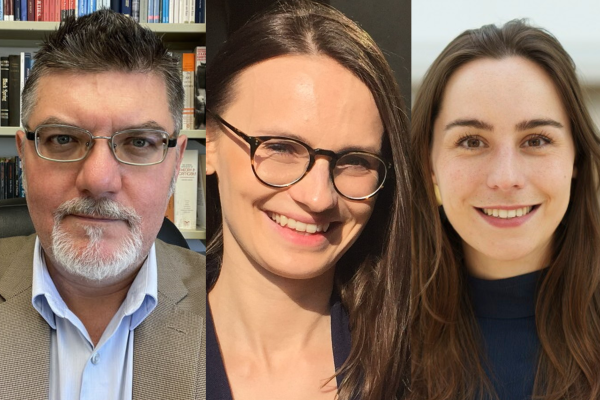
Join CSEEES' Polish Studies Initiative (PSI) and Dr. Diana Sacilowski (Department for Slavic and East European Languages and Cultures) for a special roundtable exploring the lives and experiences of members of the Polish diaspora in the U.S. and abroad.
This roundtable brings together various individuals of the Polish diaspora--known as Polonia--to examine varied experiences of international migration, of settling in a new country, and of maintaining connections with Poland and Polish heritage. Join us as participants discuss the various processes and reasons for migration (political, economic, and personal), offer insight into the experience of having a hyphenated identity, whether Polish-American, Polish-Dutch, Polish-Canadian, or otherwise, as well as provide a glimpse into Polonia communities around the world and their work and influence.
Chair
Dr. Diana Sacilowski is an Assistant Professor of Teaching in the Department of Slavic and East European Languages and Cultures at The Ohio State University, where she teaches Polish language and various Slavic culture courses. She received her Ph.D. in Slavic Languages & Literatures at the University of Illinois, Urbana-Champaign in 2021. Her primary interests include 19th-21st century Polish literature and culture, Central and East European Jewish culture, Holocaust and memory studies, and postmodernism. Diana was a recipient of a 2024 Polish Studies Initiative grant to support her project that explores how various literary texts intersect with sites of memory in order to better understand the key ideas and methods underpinning Poland’s so-called Jewish “return,” a period, beginning in the early 1980s, that has witnessed a great revival in interest in Jewish culture and history.
Speakers
Dr. George Z. Gasyna in an Associate Professor in the Department of Slavic Languages & Literatures at the University of Illinois, Urbana-Champaign. While trained as a comparativist, his chief area of scholarship has been in 20th century Polish literature, with occasional forays to the literatures of the previous century as well as to contemporary prose and film. Throughout his academic career, he has also been particularly engaged with diasporic and minority cultures, and with Jewish cultural history in pre-1939 multiethnic Poland. In the field of literary and cultural criticism, the major problems he works with revolve around themes of migration and exile, the poetics of national belonging in the context of cultural polarization, the problem of writing in one’s second or third language, autobiography and life writing, memory and postmemory studies, and travel literature. His book A Time for the Province Palimpsests and Borders in Twentieth-Century Polish Literature was recently published by McGill-Queen's University Press.
Dr. Katarzyna Granat has a Ph.D. in EU Law from the European University Institute in Florence. She was a COFUND Marie Curie Post-Doctoral Fellow at Durham University in the UK, as well as a postdoc at NYU and Johns Hopkins SAIS. Currently, she oversees the science diplomacy portfolio at the Embassy of Poland in Washington, DC. Granat completed her PhD in Law at the European University Institute (EUI) in Florence, Italy. She holds an LLM (EUI) and a master's degree in law from Warsaw University, Poland. Katarzyna was an Emile Noël Fellow at the NYU School of Law, Junior Research Fellow and Assistant Professor (Research) at Durham Law School, UK, as well as DAAD Fellow at SAIS, Johns Hopkins University. Her research expertise is in parliamentary democracy and the rule of law, and their institutional safeguards in the European Union. Currently, she oversees the science diplomacy portfolio at the Embassy of Poland in Washington, DC.
Caroline Verduin was born and raised in the Netherlands to a Polish mother. Currently, she lives in The Hague which is home to the biggest Polish community in the Netherlands, particularly Polish labor migrants. As a member of the city council, Verduin is actively working to support the too often vulnerable position of Polish people. As a result of this work, she has written an action plan called "Supporting Children of Labor Migrants in The Hague’ and is working on decreasing the risk of homelessness. In addition to her work as a member of the city council she also serves as a lecturer of Public Administration at The Hague University of Applied Sciences.
If you have any questions about accessibility or wish to request accommodations, please contact CSEEES at cseees@osu.edu. Typically, a two weeks' notice will allow us to provide access, but we will try to accommodate requests that come in after the two-week mark.
This roundtable is co-sponsored by the Department for Slavic and East European Languages and Cultures and the Ohio State Polish Club.
